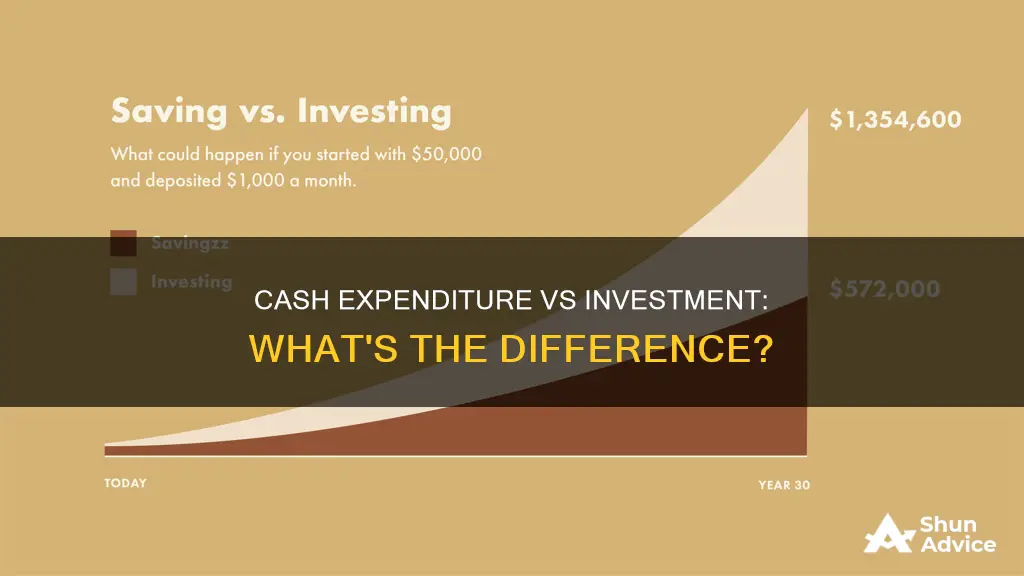
Cash expenditure and investment are two different things. Both involve spending money, and the objective is the same: to acquire a good or service. However, an investment, also known as fixed assets, is about generating a future return and becoming a lever for the business. On the other hand, a cash expenditure is a payment made with cash or credit to purchase goods or services. It is recorded at a single point in time, while an investment is not.
What You'll Learn

Capital Expenditure (CapEx) vs. Operating Expense (OpEx)
An expenditure is the total purchase price of a good or service, and it is recorded at the time of purchase. On the other hand, an expense is the amount recorded as an offset to revenues or income on a company's income statement.
There are two broad categories of expenditures in accounting: capital expenditures and revenue expenditures.
Capital expenditures (CapEx) are funds used by a company to acquire, upgrade, and maintain physical assets such as property, plants, buildings, technology, or equipment. CapEx is often used to undertake new projects or investments by a company. CapEx is a long-term view and is less predictable than OpEx.
Operating expenses (OpEx) are the day-to-day expenses that a company incurs to keep its business running. OpEx is a shorter-term expense used for the day-to-day operations of a business. OpEx is more predictable and recurs on a regular basis.
CapEx is related to long-term spending and major investments, while OpEx is related to short-term operating expenses. CapEx is listed on the balance sheet under the PP&E section, while OpEx is reported on the income statement.
CapEx is depreciated over time, and the company cannot deduct the full cost of the asset in the same financial year. OpEx, on the other hand, is fully deductible from the company's taxes in the year the expenses occur.
Examples of CapEx include the purchase of land, vehicles, buildings, or heavy machinery. Examples of OpEx include employee salaries, rent, utilities, and property taxes.
Best Places to Invest Your Cash Today
You may want to see also

CapEx and future economic benefit
CapEx, or capital expenditure, is the money spent by a company to buy, maintain, or improve its fixed assets. This includes assets such as buildings, vehicles, equipment, or land. CapEx is typically used to undertake new projects or investments and is considered a long-term investment with future economic benefits.
CapEx is often used to acquire or upgrade physical assets, such as property, plants, buildings, technology, or equipment. Companies make these investments to increase their operational scope or add future economic benefits. For example, a company may invest in new machinery to increase production capacity and meet growing demand.
CapEx is different from operating expenses (OpEx), which are shorter-term expenses incurred in the day-to-day operations of a business. OpEx includes items like employee salaries, rent, utilities, and property taxes. These expenses are essential for the ongoing functioning of a business but do not typically provide future economic benefits beyond the current fiscal year.
CapEx, on the other hand, is expected to provide benefits over multiple years. As such, CapEx is recorded on the balance sheet as a capitalized asset and depreciated over the useful life of the asset. This means that the cost of the asset is spread out and deducted from revenue over several years, rather than being expensed all at once.
The amount of CapEx a company incurs depends on its industry. Capital-intensive industries, such as oil exploration, manufacturing, and telecommunications, tend to have higher levels of CapEx. These industries require significant investments in physical assets to operate and grow their businesses.
In summary, CapEx refers to the funds used by a company to acquire, upgrade, or maintain physical assets with a useful life of more than one year. It is a long-term investment that provides future economic benefits and is recorded on the company's balance sheet. CapEx is an essential tool for businesses to expand their operations, improve efficiency, and generate revenue over the long term.
Invest to Conceal Cash: Strategies for Discreet Money Management
You may want to see also

Investment vs. expenditure: the fiscal difference
Although both investments and expenditures involve an outlay of money, there are some key differences between the two. Both involve a payment with cash or credit to purchase goods or services, but the objectives and outcomes differ.
Expenditure
An expenditure is a payment made with cash or credit to purchase goods or services. It is recorded at a single point in time, i.e., the time of purchase. It represents the total purchase price of a good or service. For example, a company buying a $10 million piece of equipment with an estimated useful life of 5 years would be classified as a $10 million capital expenditure.
Expenditures can be further categorised into two types: capital expenditures and revenue expenditures. Capital expenditures refer to the purchase of assets with a useful life of more than one year, while revenue expenditures are expenses incurred for short-term benefits, typically less than a year. Examples of capital expenditures include the purchase of land, buildings, vehicles, or equipment. Revenue expenditures, on the other hand, include salary costs and operational costs such as electricity or cleaning.
Investment
An investment, also known as fixed assets, is an expenditure that aims to generate future returns and promote the generation of regular income for a period longer than one year. Investments are considered assets and are reflected in the balance sheet. They do not result in a decrease in equity but rather a variation in the composition of assets. Investments are not fully deductible in a single tax period, unlike expenditures, which can be deductible in the fiscal year they are acquired. Investments are often made to expand a company's ability to generate revenue and earnings.
While expenditures are necessary for the day-to-day operations of a business, investments are crucial for the long-term growth and expansion of a company. Expenditures may provide short-term benefits, but investments have the potential to generate future returns and increase the company's overall value. Understanding the difference between the two is essential for efficient management and tax purposes.
Maximizing Your Spare Cash: Smart Investing Strategies
You may want to see also

Investment and the balance sheet
A cash expenditure is not the same as an investment. A cash expenditure is a payment made with cash or credit to purchase goods or services, while an investment is a type of expenditure aimed at generating future returns. Investments are typically made in fixed assets, which are expected to generate regular income for a period longer than a year.
The balance sheet is a document that groups all the assets of a company. Investments are considered assets because they are the company's property and form part of its goods and rights. Therefore, investments are reflected in the balance sheet.
There are two main types of expenditures: capital expenditures (CapEx) and revenue expenditures. Capital expenditures are funds used by a company to acquire, upgrade, and maintain physical assets such as property, plants, buildings, technology, or equipment. These are long-term assets with a useful life of more than a year. On the other hand, revenue expenditures are short-term expenses used to fund ongoing operations, also known as operating expenses (OpEx).
Capital expenditures are recorded in the investing section of the cash flow statement (CFS) and are also reflected in the balance sheet. When a company makes a capital expenditure, it must show the cash outflow on its CFS and record the equipment within total assets on the balance sheet. The cost of capital expenditures is spread out over the useful life of the asset, and companies recover the cost through depreciation.
Revenue expenditures, on the other hand, are recorded on the income statement. These are the operational expenses for running the day-to-day business and are fully tax-deductible in the year they are incurred.
It is important to distinguish between capital expenditures and revenue expenditures for tax purposes. Capital expenditures are not directly tax-deductible, while revenue expenditures can be fully deducted from the company's taxes in the same year they occur.
In summary, investments are reflected in the balance sheet as they are considered assets of the company. Capital expenditures, which are investments in physical assets, are recorded in the investing section of the CFS and are also included in the balance sheet. Revenue expenditures, on the other hand, are short-term expenses recorded on the income statement and are fully tax-deductible.
Investing in Startups: Strategies for Cash-Strapped Investors
You may want to see also

Revenue Expenditure (RevEx)
Examples of RevEx include wages, rent, power, bad debts, depreciation, telephone, printing, cost of goods (to be sold), freight, and maintenance of fixed assets.
Revenue expenditures are recorded in the same financial year they are incurred and cannot be carried forward to the next financial year. They are shown on the debit side of the trading account and income statement.
Revenue Expenditure is distinct from Capital Expenditure (CapEx), which refers to funds used to acquire, upgrade, and maintain physical assets with a useful life of more than one year. CapEx is related to long-term investments, while RevEx is associated with short-term operating expenses.
Restricted Cash: A Viable Investment Option?
You may want to see also
Frequently asked questions
A cash expenditure is a payment made with cash or credit to purchase goods or services. It is recorded at a single point in time—the time of purchase.
An investment is a fixed asset that is intended to generate a future return and promote the generation of regular income for a period longer than one year.
No, they are not. Cash expenditures are deductible in the fiscal year they are acquired, whereas investments are not. If an investment exceeds 300 euros, the tax authorities do not allow it to be deducted in full in a single period. Instead, it is charged as an expense over its useful life through depreciation.
An example of a cash expenditure is the cost of filling up a company vehicle's gas tank. An example of an investment is the acquisition of the company vehicle itself.







